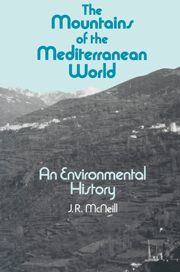Book contents
- Frontmatter
- Contents
- List of Illustrations and Tables
- Preface
- Note on Transliteration
- List of Abbreviations
- 1 The Argument: Ecology, Economy, Shells, and Skeletons
- 2 Mediterranean Mountain Environments
- 3 The Deep History of Mediterranean Landscapes
- 4 Material Life in the Mountain Environment, 1700–1900
- 5 Population, Settlement, and Landscapes
- 6 Political Economy and Mountain Landscapes
- 7 The Changing Landscape since 1800
- 8 Conclusion
- Bibliography
- Index
- Frontmatter
- Contents
- List of Illustrations and Tables
- Preface
- Note on Transliteration
- List of Abbreviations
- 1 The Argument: Ecology, Economy, Shells, and Skeletons
- 2 Mediterranean Mountain Environments
- 3 The Deep History of Mediterranean Landscapes
- 4 Material Life in the Mountain Environment, 1700–1900
- 5 Population, Settlement, and Landscapes
- 6 Political Economy and Mountain Landscapes
- 7 The Changing Landscape since 1800
- 8 Conclusion
- Bibliography
- Index
Summary
My interest in the Mediterranean world in a personal sense comes from my parents. They first met there, while serving with American forces in World War II. It was either 1944 in Egypt or 1945 in Greece: as so often in historical inquiry, available testimony is in conflict. My interest in the Mediterranean in a scholarly sense comes chiefly from brief exposure at age twenty to one of the titans of modern classical scholarship, a diminutive Oxford don named Russell Meiggs. His lectures at Swarthmore College on ancient Greek history made me want to go to Greece. I did go and, on my way there, stopped in Oxford and impudently (I was still twenty) called upon Meiggs, who with his wife fed and housed me for two days. He was too gracious to make it clear that he had better things to do with his time than entertain a hungry and grubby former student. In the course of my unannounced visit, he said many things which I still remember. One was that the Greek landscape I would soon see was a vastly different one than that inhabited by Leonidas and Alexander, and that I must try to imagine it with forests now vanished. In his last book – Meiggs died in 1989 – he suggested that a large part of the deforestation of the Mediterranean world came only recently.
- Type
- Chapter
- Information
- The Mountains of the Mediterranean World , pp. xiii - xivPublisher: Cambridge University PressPrint publication year: 1992

